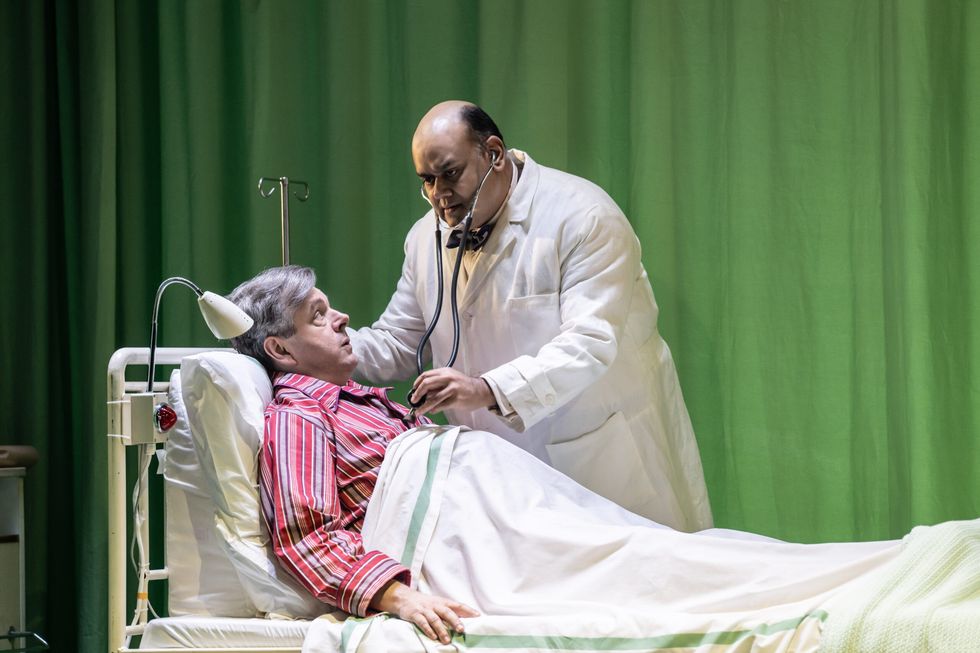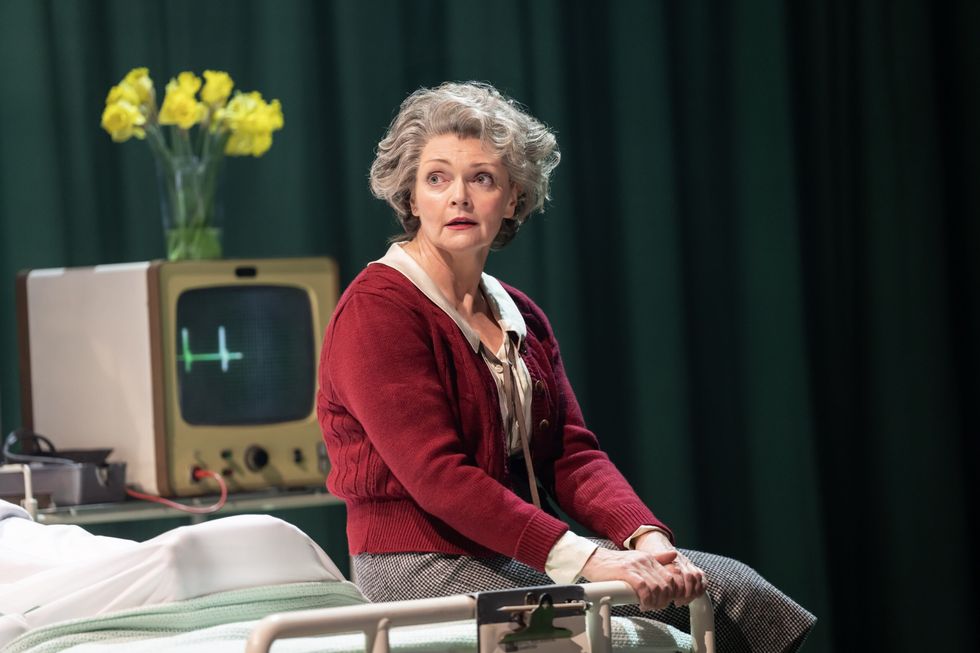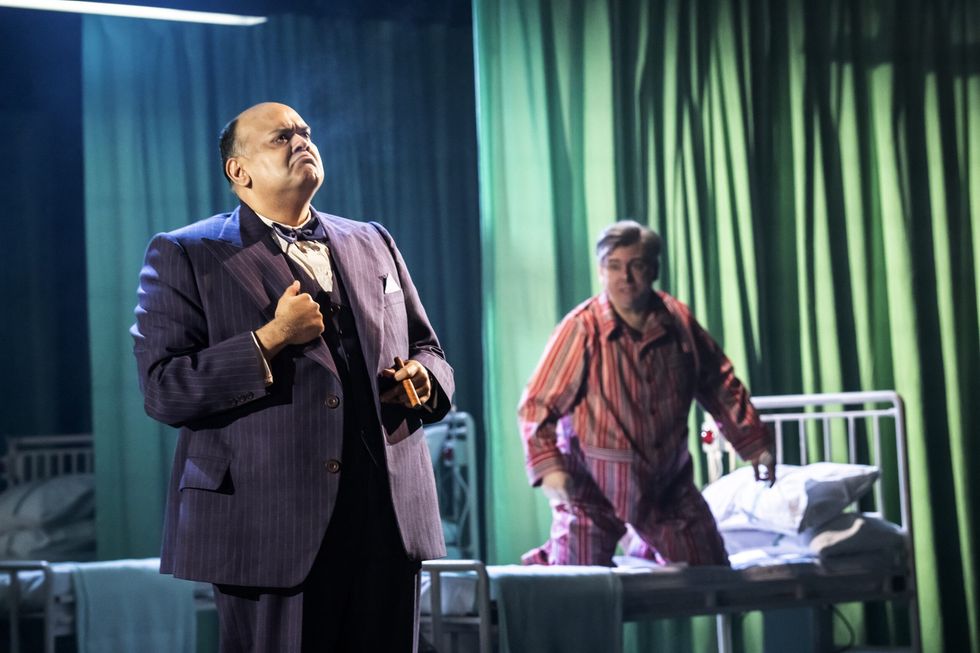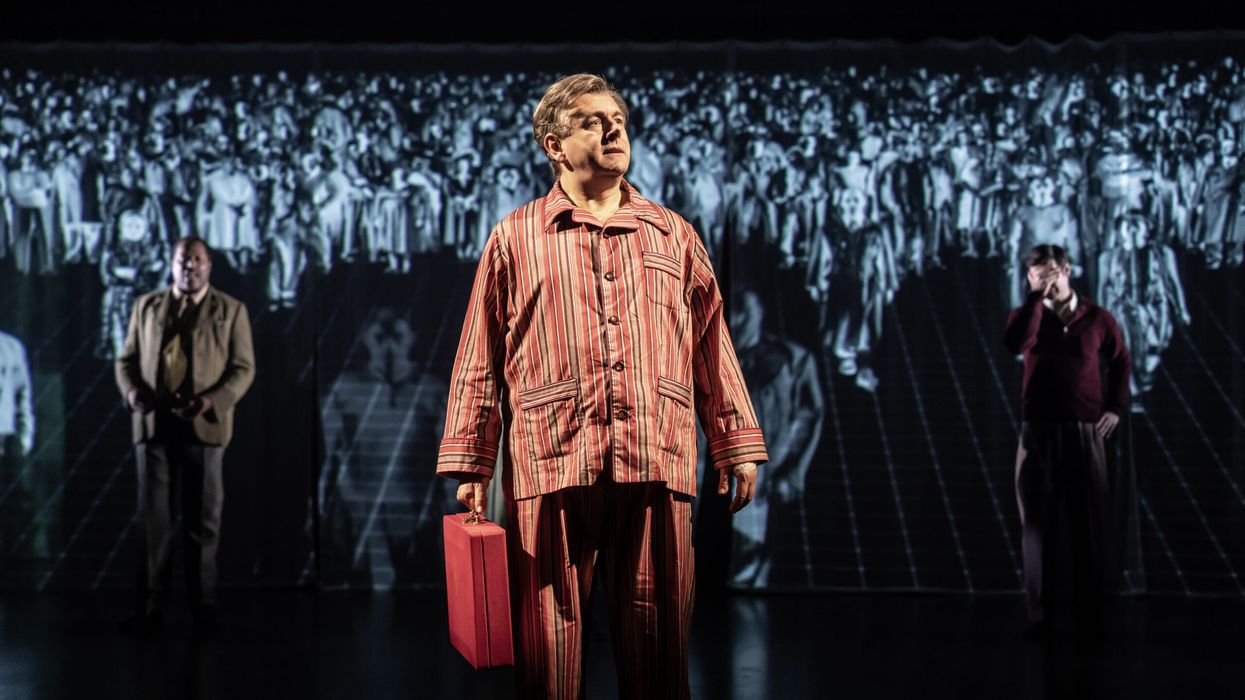ANY Asian doctor, nurse, or indeed anyone who has worked for the National Health Service (NHS) should go and see Nye at the National Theatre.
The play tells of the battles that the Welsh Labour politician, Aneurin (“Nye”) Bevan, had with Winston Churchill and the Tories, some people in his own party and the British Medical Association in establishing the NHS on July 5, 1948.
Thinking of my own stays in hospitals and those of near and dear ones, I found it a very moving and powerful play.
Bevan – his nickname, “Nye”, gives this new work its name – is brought vividly to life by the Welsh actor, Michael Sheen, who gave a speech in 2015 in which he described the founder of the NHS as a mythical creature, who “had cast-iron integrity and a raging passion”.
Bevan died, aged 62, of stomach cancer on July 6, 1960. His wife and fellow MP, Jennie Lee (played by Sharon Small in Nye), an important figure in her own right in the Labour movement, was by his side.

Tim Price’s play, described as a “Welsh fantasia”, begins with Bevan in a hospital bed towards the end of his life, remembering his childhood – when he was beaten by his headmaster for having a stammer; working as a youth in a coal mine just as his father had done with fatal consequences (“black lung”); going into Labour party politics; being elected the MP for Ebbw Vale in 1929 and holding the seat until his death; his fights with Winston Churchill, both during the Second World War and afterwards; and achieving his life’s mission by establishing the NHS as minister for health and housing in Clement Attlee’s cabinet from 1945-51.
Throughout the play, Sheen wears hospital pyjamas.
Tony Jayawardena is physically much bigger than Churchill, who was about 5ft 6in, but impressed nevertheless as Britain’s wartime leader, as well as Dr Dain, who looks after Bevan at the end.
It’s brave of the National to cast an Asian as Churchill, but this is theatre, where reality is suspended. After all, an actress, Stephanie Jacob, plays both a hospital matron and Attlee, who became prime minister after Churchill’s shock defeat in the 1945 general election.
The play explains that Bevan wanted an NHS because Britain, which had a population of 50 million in the mid1940s, was a country where the rich had access to the best hospitals and consultants, while the poor were dying of preventable diseases and often had to undergo operations without an anaesthetic (the kind of reports we are now getting from Gaza).
In the play, we hear Bevan constantly besieged by the plaintive cries of patients when he first becomes minister for health and housing.
For example, Patient One: “Minister? You have to help. St Hilda’s won’t take my son because he’s got polio and they do only acute medicine.”
Patient Two: “There’s a diphtheria outbreak in the schools; people are dying waiting to be tested.”
Patient Three: “Help us, Minister, my baby has TB, but they forgot to put the legs of her cot in tins of oil to stop the cockroaches from climbing up. A cockroach got into my baby’s cot, and now my baby’s deaf.”
Patient Five: “Please, Minister, I don’t know who else to turn to, I broke my wrist and the doctor can repair it, but I can’t afford the anaesthetics for the operation.”
Patient 11: “There’s no cancer specialist in my town, so I have to travel five hours for an appointment.”
Patient 17: “Please, Minister. The almoner says I have to pay two shillings for my radium but I don’t have that money.
“If I don’t pay, she says she is going to stop that treatment.”
And so on. The pressure on Bevan is truly relentless.

Nye paints a very unsympathetic portrait of Churchill, the great wartime leader who is now in the opposition. Many Asian historians hold him responsible for aggravating the effects of the Bengal famine of 1943, but in Nye, he is depicted, fairly or otherwise, as someone uncaring and determined to sabotage Bevan’s NHS Bill.
Nye: “There is nothing noble about your support for doctors, you have personally voted against the National Health Service twenty-one times.”
Churchill: “You want doctors to be servants of the state.”
Nye: “I want doctors to be servants of the people.”
Doctors also oppose the bill as they want their privileged positions to remain unchanged. A ballot organised by the BMA shows 4,734 for the bill, while 40,814 are against it.
Churchill: “Finished.The noisy member for Ebbw Vale is finished.”
Nye is defiant, even though many MPs on his own side want him to water down his bill: “I will launch my new National Health Service in three months’ time, with or without the doctors.”
And, despite all the odds, that is what happens. With a mixture of ultimatums and concessions, Bevan is finally able to bend a recalcitrant BMA to his will.
Nye: “I will launch my new National Health Service in 10 days’ time on July 5, with or without the doctors. Finally, I understand that becoming a salaried worker is a concern. I will make doctors the highest paid profession in the country.”
Churchill: “He’s lying.”
Nye: “Join me and take the most civilised step any country has ever taken. And together we will build the greatest health service the world has ever seen.”

The BMA, represented by multitudes of faces and voices on a screen, finally admits defeat: “The BMA negotiating committee recommends all doctors sign an NHS contract.”
The play ends with a brief message put up on the stage: “Within 10 years of the creation of the NHS, infant mortality decreased by 50 per cent. Since its founding, life expectancy has increased by 12 years. Every day, 1.3 million people are treated based on clinical need, not the ability to pay.”
At one point in the play, Nye had told an unsupportive fellow cabinet minister, Herbert Morrison, of the logic behind setting up the NHS: “Okay. The health service is a complex mess – it is impossible to navigate and grossly unfair.
“The voluntary hospitals serve the rich and the council hospitals, the poor. The wealthy cities have all the facilities and all the specialists. And the poor regions are stuck with Victorian hospitals falling apart, so we’re left with an uneven service across the country, where poverty is a disability and wealth is an advantage.
“In Sunderland, one GP has to cover 1,800 patients, but in Chelsea, one doctor has 200 patients. People are dying of preventable diseases, because they can’t get seen, they have to travel too far, or the cost of the treatment is too much.”
He wants to model the NHS on the contributory medical charity that had been set up in his home town of Tredegar in Wales: “I want to Tredegarise the whole country. A uniform service so it doesn’t matter where you are; you can get the same service as everyone else, for free, at the point of need.”
In January 2021, during the pandemic, people clapped for employees of the NHS, which marked its 75th birthday on July 5, 2023.
In Nye, Bevan acknowledges: “We shall never have all we need. Expectations will always exceed capacity…the service must always be changing, growing and improving; it must always appear inadequate. I don’t want to give you relief. I don’t want to give you medical care. I want to give you your dignity.”
The play appears to have been written with contemporary politics in mind. But if it has a lesson, it is that the NHS is needed most by the poor.
Nye is on at the National Theatre until May 11, 2024




